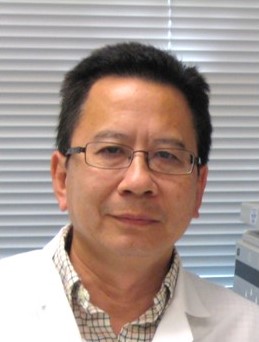
Office:
LSUHSC School of Medicine
533 Bolivar Street, CSRB Room 623E
New Orleans, LA 70112
504-568-2437
Bio
Dr. Michael Lan received his PhD degree from Duke University Medical Center, Department of Microbiology and Immunology in 1986. He studied in Dr. Richard Metzgar's laboratory on a project of characterization of a human pancreatic solid tumor antigen using a monoclonal antibody (DU-PAN-2) and continued his post-graduate work of Muc1 (DU-PAN-2) gene cloning until 1990. Fourteen peer-reviewed papers were published during his graduate (41/2 years) and post-graduate (3 years) studies at Duke. These publications documented that DU-PAN-2 monoclonal Ab recognizes a valuable diagnostic biomarker for pancreatic cancer and the cloning of Muc1 gene paves the way for future understanding of the functional role of Muc1 gene in human pancreatic cancer. He received Richard O. Burns’ Graduate Student Research Award at Duke University in 1986.
Between 1990-1997, Dr Lan received a Senior Staff Fellowship Award from Dr Abner Notkins' Laboratory of Oral Medicine, National Institute of Dental Research (NIDR, Bethesda, MD). A pair of islet autoantigens (IA-2/IA-2β) were identified as important biomarkers in type I diabetes (T1D). The discovery of IA-2/IA-2β as pre-diabetic diagnostic markers in T1D was well received in diabetes community (press released in March/1996). Dr. Lan served as a project-leader and later promoted to a tenured Staff Scientist (GS-14-2) working on the molecular biology aspects of pancreatic islet cells (insulinoma). He initiated and directed the molecular cloning of five islet-associated antigens including IA-1 (INSM1), IA-2/IA-2β, IA-3 (PDIp), and IA-4 (proSAAS).
In 2010, Dr Lan's laboratory in LSUHSC (New Orleans) studied the molecular mechanism underlying the differential insulin gene expression in human thymus. The project aims to develop a novel strategy for prevention of insulin autoimmunity in T1D. Dr Lan developed a cell-based screening method to identify small molecules that can enhance the INS-VNTR (I)-promoter and insulin gene expression in thymic epithelial cells. In this study, a novel concept was presented as identifying vitamin A supplement that could provide early modulation of INS-VNTR haplotype for insulin gene expression in thymus, which would be beneficial for prevention of insulin autoimmunity in T1D patients (JCEM, April 15, 2025).
In 1997-present, Dr Lan moved to the Research Institute for Children, Children's Hospital New Orleans/Departments of Pediatrics/Genetics, LSUHSC New Orleans as an independent investigator/tenured Professor. He continues his research interests in transcription factor regulation, T1D, islet cell biology, molecular biology of neuroendocrine (NE) cancer, diagnostics, and treatment. INSM1 is a NE-specific transcription factor, which plays a critical role in the pancreatic endocrine cells, sympatho-adrenal lineage, and the developing brain neurogenesis. Based upon the unique feature of NE-specific INSM1-promoter, Dr Lan developed a strategy for NE-targeted cancer gene therapy. INSM1 not only functions as a transcription repressor, but also possesses multiple extra-nuclear activities in cell signaling axis of NE cell growth and transformation. Therefore, it is plausible that INSM1 itself or cellular signaling components associated with INSM1 could be the target for NE cancer therapy. The body of work strongly supports the idea that developing a new strategy of NE cancer treatment using signaling inhibitor could provide insights to advance the field.
Dr. Lan was recognized and appointed to the Children’s Hospital Professorship of Pediatric Research (2014). Dr. Lan published >100 peer-reviewed papers and was granted five US patents. He received multiple grant awards from the Juvenile Diabetes Research Foundation (JDRF), NIDDK/NIH, NCI/NIH, Diana Helis Henry Medical Research Foundation (DHHMRF), American Diabetes Association (ADA), LSU Collaborative Cancer Research Initiative (CCRI), LSU Leveraging Innovation for Technology Transfer (LIFT2) Grant and LSU Health Research Enhancement Program (LSU-REP).
Education
1976 - B.S. in Chemistry, SooChow University, Taiwan, R.O.C.
1980 - M.S. in Molecular Biology, National Tsing Hua University, Taiwan, R.O.C.
1986 - Ph.D. in Microbiology and Immunology, Duke University, Durham, NC USA
Publications
- Chen, C., Breslin, M.B., and Lan, M.S.: Sonic hedgehog signaling pathway regulates INSM1 transcription factor in neuroendocrine lung cancer. Cell. Signal. 46: 83-91, 2018.
- Wang, L., Sun, Z.S., Xiang, B., Wei, C., Wang, Y., Sun, K., Chen, G., Lan, M.S., Carmona, G.N., Notkins, A.L., and Cai, T.: Targeted deletion of Insm2 in mice result in reduced insulin secretion and glucose intolerance. J. Transl. Med., 16: 297-305, 2018.
- Chen, C., Breslin, M.B., Guidry, J.J., and Lan, M.S.: 5’-iodotubercidin represses insulinoma-associated-1 expression, decreases cAMP levels, and suppresses human NB cell growth. J. Biol. Chem., 294: 5456-5465, 2019.
- Chen, C., Notkins, A.L., and Lan M.S.: Insulinoma-associated-1 (IA-1/INSM1): From neuroendocrine tumor marker to cancer therapeutics. Mol. Cancer Res. 17: 1597-1604, 2019.
- Chen, C. and Lan, M.S.: A promoter-driven assay for INSM1-associated signaling pathway in NB. Cell. Signal., 76: 109785, 2020.
- Chen, C. and Lan, M.S.: Interplay: the essential role between INSM1 and N-Myc in aggressive NB. Biology, 11: 1376, 2022.
- Chen, C., Wu, J., Hicks, C., and Lan, M.S.: Repurposing a plant alkaloid homoharringtonine targets INSM1 in N-Myc-activated NB, Cell. Signal., 109: 110753, 2023.
- Lan, M.S. and Chen, C.: Small molecules targeting INSM1 for the treatment of high-risk neuroblastoma. Biology, 12: 1134, 2023.
- Chen, C., Yu, L., and Lan, M.S.: Modulation of functional activity of INS-VNTR class I haplotype derived from Type 1 diabetic patients. J. Clin. Endocrinol. Metab., 2025 (In press).
- Chen C, Cheng S, Yu X, Lee Y, Lan MS. Regulation of INSM1 Gene Expression and Neuroendocrine Differentiation in High-Risk Neuroblastoma. Biology (Basel). 2025 Dec 22;15(1). doi: 10.3390/biology15010022. PubMed PMID: 41514864; PubMed Central PMCID: PMC12784908
NCBI: My Bibliography
Research Interests
- Study of transcription factor in neuroendocrine (NE) differentiation and transformation.
- Signaling pathways involved in NE development.
- Molecular targeting transcription factor and signaling pathway against NE tumors.
- Evaluation of NE biomarker diagnosis and drug therapeutic discovery.
- Study of insulin autoimmunity, tolerance, and type 1 diabetes (T1D).
